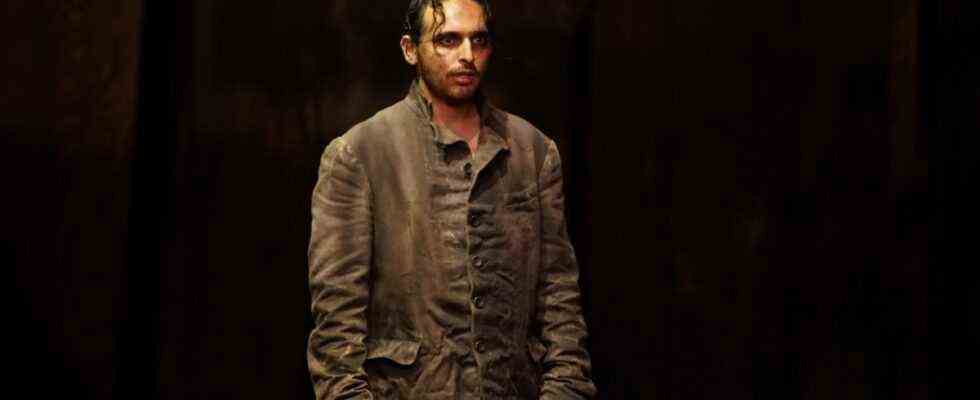In the end Michael Kohlhaas gets his big monologue, it has to be like that in the theater. Max Simonischek stands in front of the microphone, a guy like a tree, his face as if carved out of hard wood, the language vibrates, the voice threatens to become fragile. The monologue is not free speech, it is the story of Kohlhaasen’s execution, as Heinrich von Kleist wrote it down. It includes: the touching farewell to the children, the enigmatic note with the prophecy of the future of the House of Saxony, which Kohlhaas eats like a last host, the satisfaction of ultimately getting right, in two different ways, because the shameful Junker punished and his own head is chopped off. Simonischek is deeply impressive. Like a lot on this evening.
For some time now, the Bregenz Festival has been cooperating with major theaters in such a way that they do not simply invite existing productions, but that they have their premiere in Bregenz. This year, Andreas Kriegenburg is staging Kleist’s “Michael Kohlhaas” with the entourage of the Deutsches Theater Berlin in the Theater am Kornmarkt; the Berlin premiere is in October.
At Kriegenburg, the morality of the avenger is a tableau with seven chapters
Kleist wrote his long story when the legitimate right to political resistance, not just against Napoleon, was being discussed in Europe. It takes place at the beginning of the 16th century, when the princes had not yet disappeared into absolutist inaccessibility and dealing with law was even more direct and down-to-earth. Junker Wenzel von Tronka brings Kohlhaasen’s horses to shame, beats his servant, petitions to the court are unsuccessful, Lisbeth, the wife, is killed when trying again. Kohlhaas, a respected horse dealer, begins his campaign of revenge. First the Junker’s castle burns, then Wittenberg, then Leipzig, Kohlhaas gains popularity from the discontented population, not even Luther can stop him, and yet the bitter believes in his rights until the end, until his head rolls.
Kriegenburg transfers the morality from the individual, stubborn avenger to a tableau of seven chapters, beginning with the encounter between Luther, the wonderfully creaking Markwart Müller-Elmau, and Kohlhaas. Both are media professionals of their time, reaching more people with their attacks and leaflets than many Internet henchmen would like to have today. However, they cannot find a balance. Then it cracks and rumbles on the stage, the performers pick up the rough boards from which Harald Thor built a draughty box, they play havoc as a frenzied chorus or the complete confusion of the political intrigues surrounding Fall, they do some funny things Stuff and speak in many tongues, all of them very nicely.
But Kriegenburg subverts the powerful male theater of guys in rough lines, introduces two narrators, Lorena Handschin and Brigitte Urhausen, who comment on male narrow-mindedness, the clubbing, the stupidity and reveal a completely different solution to the misery, a humanly clever one. But it doesn’t come to that. Not yet.

